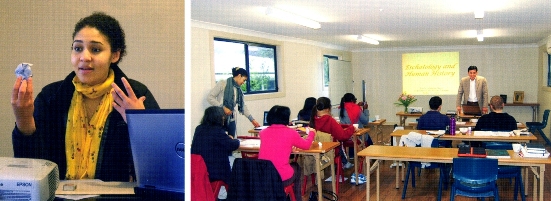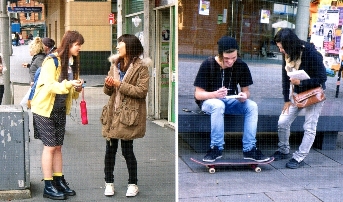![]()
The Words of the Camara Family
|
|
The Words of the Camara Family |

Mica
teaching; here she is explaining the destruction caused by the Fall;
Right: Soon Teck Lim national leader of the Australian church,
explains the true significance of the Last Days.
Mica Camera worked in human resources at a large company in Australia for two years before a decision to attend a church workshop refocused her life. In this interview, she shares her personal course, including her view of the developing witnessing mind-set in Australia.
Question: You finished the 120-day workshop in Korea in 2010 and then immediately committed yourself to a public responsibility.
I hadn't done any of the church programs that second-generation members go onto, so I was looking to gain some experience in public work.
I had felt [from the 120 days] that it was my mission to promote the heavenly texts and build up the Hoon Dok tradition. My national leader called me to work with the youth of our church. I was made the leader of the witnessing team -- which consisted of no native Australians but of entirely Japanese. They were good at inviting people to come to the center but it was hard for them to get them to go further because of the language barrier. They really needed a local person. The regional president then assigned me as the main lecturer.
Question: Did you have to scramble to prepare to teach the Principle?
In every way the 120-day workshop prepared me for the life I am living now -- We offered Jeong Seong, learned how to live in an environment with very different types of people, ate different foods, and sometimes couldn't understand what someone said because of the language barrier. And of course the lecture practice gave me the confidence that I could actually lecture. I had pretty much memorized the entire one-day content. Based on that, I was able to teach the Divine Principle in a powerful way. This year I have been asked to prepare for the five-day workshop.
Question: How does investing in church mission work compare to working in a company?
When I began in the mission here many people said "Oh wow, you're giving up your life," meaning I was not working anymore, not earning money, as if coming into a public church mission means life has stopped. On the contrary, I felt it was giving me life. The reality of my workplace, by contrast, was not life -- I didn't have a vision or feel any progress. But coming into the church and starting to work I came to have a vision and to have passion for what I was doing. It had meaning.
I had also wanted to work in a workplace that didn't necessarily have 9 to 5 hours, and I was not averse to being busy. I wanted to be working toward something.
I had also liked the idea of being able to travel. Recently I sent a message to a friend of mine saying I was off to New Zealand for my work -- to give lectures to second-generation members. Her reply was, "Oh your ideal job seems to have appeared!" When I reflect upon it, all the things I had wanted in a work situation are present in what I am now doing. I haven't given up on life; working with the church is actually giving me life.
Having new members around is also interesting -- you are raising young members as well. That's a very different course. In this role, all that Father has said has become so real to me, the reality of witnessing, loving people, and dealing with challenges.
I went through a period when my heart was often deeply moved. I always testify to those who join the witnessing team that they come here to learn God's heart. You come to feel it, and your heart connects more deeply, allowing you to have much more personal and closer relationship with God. This certainly happened to me. I could easily break down in tears feeling God's heart of wanting to talk to people, wanting to teach people, wanting to relate with people but not always being able to do so.
I felt that if you want to know and testify to God's heart, if you feel the desire to help someone know the truth that has given your life, engaging in the work of witnessing to others will bring you to that point.

Mica
Camara witnessing
Question: What are the elements of the results-driven strategy?
The main element is the focus -- "I want to meet a core member." That means someone who will have a conversion experience and is willing to separate from this secular culture to one centered on Cod and True Parents. "Results-driven" means focusing not just on building relationships, not just getting people to come through our doors with only limited follow-up. It means there must be continuity, always a clear next step, giving contacts a clear time and place to come again..
So we are recruiting. We witness to those who have the potential to become core members, who can take the time off to pursue the training. So we witness to young people. We have a clear course of steps that a new person will follow. This goes up to a twenty-one-day workshop, some center life training, or even full time membership.
It is results-driven in that we are focusing on bringing people to core membership. We are not just dealing with people on the basis of good relationships, but actually bringing them to the next level at each point in their journey.
There are many elements that came together last year. One of them was having the five-day workshop -- at a set time in a good environment. That was key in getting people to change their mind-set. Even the first one to join had been around a long time and didn't know Principle well, or its conclusion. The five-day workshop included explaining the Messiah, Father's life and the blessing -- and it was very clear where we are heading. "We are not here to just talk about the goodness of the Principle; we are here to lead you to know the Messiah and lead you to the blessing."
It gives much more power to our witnessing to give them a point of having to make a decision, Yes, I want this, or No, I don't want this. In the past we did not always bring people to such a point.
Question: Do people sign membership after a workshop?
Yes, we asked the guests on the first five-day workshop to become members. At first I wondered if it was a bit too much. Then I realized that sometimes it's what's needed for people to make a condition to move closer to God. And that can help them continue.
With anything, even in the business world, there is a point at which people need to commit themselves. If not, that's it. Otherwise a person remains half in and half out all the time.
Question: Would you like to say something to other second-generation members out there?
I have learned many things about myself and people as well as about Heavenly Father and True Parents that I know would have taken me a long time to understand and learn (if I could have learned them at all) had I not taken this path. One thing I have come to realize is how much our movement needs those in its second generation to take more responsibility in developing and continuing the growth of our church.
If we believe in what True Parents have established and are benefiting from their foundation and that of our elders who have gone through a course to bring us to where we are now, we need to realize this will not last or grow if we second- generation members do not take the initiative to help it do so. For me, this does not mean we are now in the era of the second generation and that of our parents is gone, but more that we are in a transition period when we need to begin inheriting what our parents and elders have done, by working with them at this time. This is so that we do not lose that foundation.
I came to see that I cannot just go on the assumption that the church will always be there. The truth is, if we fail to inherit from our elders and learn with them about how to raise young members, establish a witnessing system, give sermons and so on, we will have no idea what to do when our elders are no longer around. We will be left standing on a foundation we do not understand, let alone know how to use.
We second-generation members are truly in a new era where the course to bring about results is faster than that of our parents, but only because we stand on their foundation. So the time is now! We need to take on the role of building upon what our parents have started. When that day comes, there is no doubt in my mind that we will see progress in all aspects of our life -- church, family, finance, etc. I am sure it will exceed our expectations.

Young
Korean and Japanese members signed on to spend a year witnessing in
Australia; Here, two of them are hard at work on the streets of
Sydney.
At the National Leaders World Assembly 2012, Miss Mica Camara spoke about witnessing efforts in Australia, a member nation of the Oceania region. Her witnessing testimony was not about the influx into the Australian church of "a great multitude, like the roar of rushing waters," as described in the Bible. It was more akin to the story of Abraham and his wife Sarah through Sarah's long barren years, struggling to find faith under circumstances suggesting the strong likelihood that no child would ever come.
The first missionaries had arrived in Australia in 1972, and the 1970s were Australia's most productive decade. It was a time when people were searching for truth and membership increased every month. Following the 1982 Blessing Ceremonies, couples began family life, babies were born, the number of full-time members began to dwindle and virtually no new members appeared. Members did witness but results did not come. Like a professional athlete experiencing a prolonged slump, it became increasingly difficult to fight the idea that success might never come again.
In more recent years, Australian members did eight forty-day witnessing campaigns in a row. As a result, some member: did join, but only two remained. Japanese volunteers came to Australia in the early 1990s and stayed for about half of that decade. They came again in 2000. According to Mica, "They invested their complete effort into witnessing but still the read was not there. One guest joined for a year but then left." Mica also mentioned that before she became interested in witnessing, blessed wives were actively engaged in outreach, but to no avail. In terms of church growth, Australia was experiencing what Mica described as "a long drought."
Though it is not simply a matter of cause and effect, a parallel is nonetheless apparent between Australia's ongoing resurgence, and spiritual renewal in Mica Camara's own life. In a videotaped testimony' given in May 2011 to members of our church in Melbourne, Australia, Mica said that even three years earlier it would have been unheard of for her to be speaking about her faith from behind a pulpit. "I wasn't a person to be involved in church activities.... I believed in God, but True Parents were still quite distant from my heart. They were just like a picture, in fact."
Mica had graduated from university, where she'd majored in Business, gotten a good corporate job working in the human resources field and was planning to travel. It was just what she had wanted, but less than a year later, she was feeling trapped and without vision in life, "just doing the same routine, just following the momentum of society." She wondered, "Why do people feel we just can't control our lives? Why do I feel like that?"
The world was weighing down on her spirit so much that when her father called from Chung Pyung and suggested to her that a forty-day workshop there would be easier, she thought, "If anything could be easier than my life right now, I so want to take it." Despite this thought, she was still outwardly resistant. She told her father no. Yet, he persisted, launching into parent–child negotiations -- forty days? Twelve? Seven? Mica's final answer before hanging up was still no, but, after some reflection, she went for seven days. She stayed for forty.
While she was at Chung Pyung, she met True Father. With only four other members she waited lakeside for Father's boat to return to shore near the training center. A few minutes before they would have to leave, she saw Father, with a towel draped over his head to ward off the cold, sitting in the back of the boat tranquilly gazing into the distance. As Father approached his car, Mica and her friends ran up very close to Father and bowed. In return, Father looked at them, smiled and got into the car.
That brief experience made a profound impression. "I just felt I was a daughter waiting for my dad to return.... Wow! I just greeted my father," Mica said. She had caught a glimpse of the world from Father's perspective. "He loves everyone and at the same time, God. He wants to liberate God and everyone. I remember feeling that kind of love from Father and True Parents. The connection was just so much stronger."
Attending a 120-day workshop that ended in July 2010 helped solidify Mica's determination to work in a public mission and to take up leadership responsibilities. That a blessed child's emergence coincides with developments in Australia does not mean this was a lone effort. Mica works under the guidance of National Leader Soon Teck Lim, who was seen on a video that accompanied Mica's presentation announcing the spiritual birthday of a new Australian member, "One week after the Divine Principle workshop, she prayed about it, she spoke to her parents about it, she talked to her friends and finally, she decided to become a member!"
And it was Continental Director Dong Wooh Kim who had started a campaign to recruit people from Japan and Korea to do street witnessing for a year in Australia. This resulted in one member joining in 2010 and prepared a foundation for a new witnessing strategy in 2011. A committed team of foreigners, a results-driven system and more time dedicated to witnessing changed the atmosphere. For the first time in two decades, six members joined in Australia in 2011.
Where might the Australian church go from here? Look toward heaven, Australia, and number the stars, if you are able to number them.... So shall your spiritual descendants be.